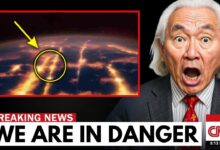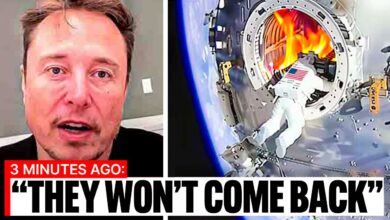URGENT: The Hidden Message in ‘The Electric State’ That Predicts Humanity’s DARK Future
The Electric State by Netflix may initially seem like just another big-budget adventure film, but beneath the robots and the road trip lies a deeper message about humanity’s future and the irreversible consequences of technological dependence. The movie takes viewers on a journey across a shattered America, not through lively roadside diners or greasy pit stops, but through landscapes haunted by the remnants of a long-forgotten war. The world of The Electric State is a bleak space where people are no longer whole — most have lost themselves in virtual worlds, abandoning their physical forms like soulless puppets. Everything seems stuck in a state of gloomy twilight, except for rare moments when daylight reveals the barren, desolate scenery. Alongside are bizarre creatures, technological Frankensteins pieced together from the scraps of machines and human consciousness, creating an atmosphere of deep horror and loneliness.
At the core of the story lies isolation and loss. The protagonist, Michelle, accompanied by the robot Cosmo, travels through the devastated world, seemingly indifferent to what has happened — as if they are drifting through the ruins of something long dead. Their journey feels detached from the surrounding horrors, yet the ultimate purpose of the trip, revealed at the end of the film, carries a weight far greater than the ruins outside. The film is not just a post-apocalyptic tale but also a lament for lost humanity, exploring profound themes of isolation, childhood memories, and the complex emotions of the LGBTQ+ community.
Netflix’s adaptation offers a completely different experience from Simon Stålenhag’s original novel. While the book is filled with silence and eerie melancholy, the film is more adventurous, humorous, and appeals to a broader audience. Michelle is not just a sullen teenager but a girl searching for her family and herself after painful losses. The film expands the world Stålenhag created, transforming it into a more expansive narrative that delves into issues like societal control, corporate manipulation, and philosophical questions about the meaning of humanity in the age of machines.
A notable difference is the film’s tone. The book is dark and contemplative, while the movie is humorous, occasionally even lighthearted, especially with the character Keats, played by Chris Pratt. This shift makes the film more accessible, but it may feel “out of sync” for those who appreciate the novel’s meditative atmosphere.
However, The Electric State is not just a science fiction story. It serves as a warning about humanity’s relationship with technology, about our increasing dependence on machines and AI in daily life. Technology can connect us, but it can also isolate us, trapping us in self-created illusions. The biggest question the film raises is not whether machines can become human, but whether we can still hold on to our humanity in a world increasingly controlled by technology. The Electric State is both a cautionary tale about a not-so-distant future and a mirror reflecting the present — a world where reality and fiction increasingly blur and become indistinguishable.




